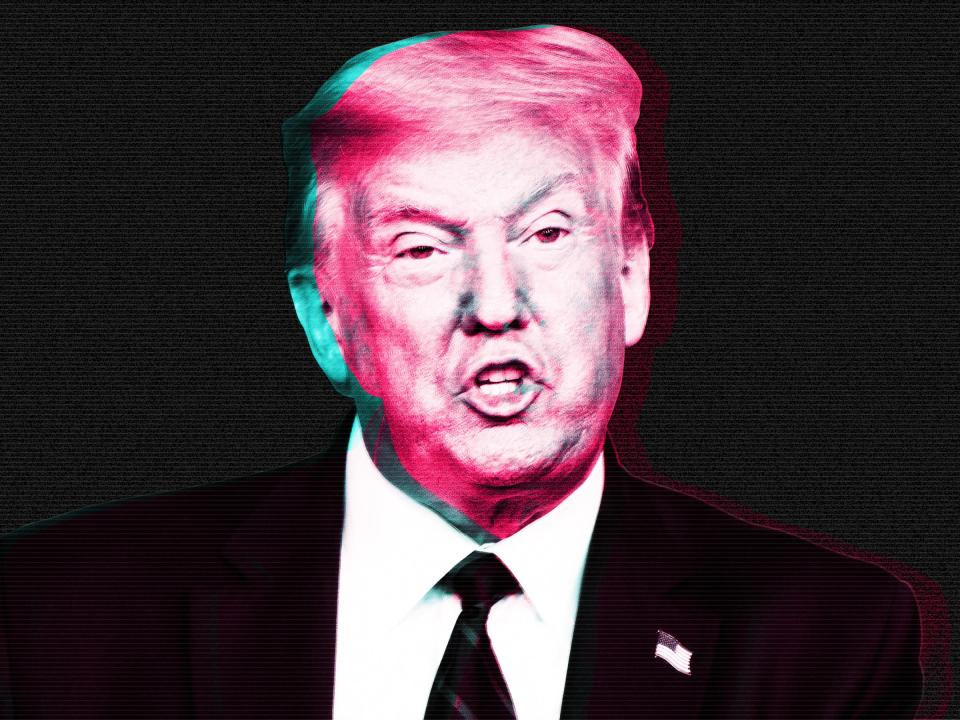Trump's push to ban TikTok, explained in 30 seconds

Jim Watson/AFP via Getty Images; Samantha Lee/Business Insider
The US Commerce Department announced Friday it would ban TikTok and WeChat from app stores on September 20.
With the deadline just two days away, TikTok is rushing to put the finishing touches on a deal to assuage the US government's concerns about national-security risks posed by the app's ties to China.
Reports indicate the deal will include the creation of a new TikTok entity in which US investors, including Oracle, replace TikTok's current parent company, ByteDance, as majority stakeholders.
The next two days will be crucial for TikTok, which will see whether its bid to stay in the US is approved. TikTok has also filed a lawsuit against the Trump administration to fight the ban.
Here's everything you need to go about what's going on with the US government's threat to ban TikTok.
TikTok, a product of the massive Chinese company ByteDance, came to the US in 2018. The app's addictive recommendation engine and simple video-making process quickly turned it into a mainstay in internet culture. It now has more than 100 million users each month in the US.
As TikTok's popularity has grown, so has scrutiny from US lawmakers over its roots in China, a country President Donald Trump has readily painted as an enemy during his presidency. Chinese law requires domestic companies to "cooperate" with the state's security efforts — a connection that raised concerns about the government's influence over TikTok content moderation in the US and its access to American users' data. The US government quietly launched an investigation in November 2019 into TikTok's potential national-security risks, a review led by a government body called CFIUS, which reviews foreign investments in the United States.
TikTok's popularity continued to rocket in 2020. Mainstream attention turned to TikTok when its userbase said it falsely inflated the expected attendance for a major Trump rally in Tulsa, Oklahoma. At the start of July 2020, Trump administration officials first stated publicly they were considering banning TikTok in the US.
On July 31, reports emerged the president would soon turn his words into action. The Trump administration weighed two options: a nationwide TikTok ban, or a directive for ByteDance divest its TikTok operations in the US. In his first executive order, Trump set a deadline for ByteDance to find an American buyer, threatening to bar "any transactions" between Americans and TikTok by Sept. 20 — a date murky and debated due to conflicting statements and orders from the Trump administration.
Although Trump seemed to initially lean toward an outright ban, the administration invited ByteDance to look for a bidder to satisfy US government concerns and avoid a ban. Microsoft emerged as the early, eager frontrunner with a multi-billion-dollar proposal to acquire a stake in TikTok's US assets. But Microsoft's bid fell apart at the eleventh hour and Oracle, which is run by a high-profile Trump supporter, emerged last weekend as the dark-horse bidder. What's resulted appears to be a far cry from what the Trump administration initially said it wanted, and although the terms haven't been finalized or announced it appears a new global US-based TikTok entity will be created, with US investors (including Oracle) replacing ByteDance as its majority shareholder.
On Friday morning, the Commerce Department expanded further on the details of TikTok's imminent Sept. 20 ban. The order bans all new US downloads of TikTok, and stops existing users from receiving software updates. The US government also threatens to ban the app's functionality on Nov. 12 by targeting internet service providers.
Read the original article on Business Insider

